

World Bank’s Executive Directors Select Dr. Jim Yong Kim 12th President of the World Bank Group. WASHINGTON, April 16, 2012 - The Executive Directors met today to select a new President of the World Bank Group.
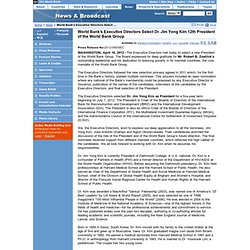
The Board expressed its deep gratitude for Mr. Robert B. Why the big rush to vote for a World Bank president? On Monday 16 April, the World Bank board is scheduled to vote on its choice for the next World Bank president.
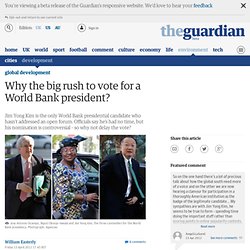
There is no compelling reason for this date, but there are excellent reasons to consider a delay. The deadline seems especially unfortunate since the American nomination of Jim Yong Kim has generated unprecedented controversy, and two credible alternative candidates have been nominated in Ngozi Okonjo-Iweala and José Antonio Ocampo. The Centre for Global Development (CGD) and the Washington Post co-sponsored a forum that would have been an ideal place for Kim to address the controversies. Okonjo-Iweala and Ocampo spoke at the forum earlier this week, but Kim declined to participate. An administration official kindly agreed to speak with me last Wednesday evening about why Kim did not participate in the forum. Moreover, Kim's nomination happened at the last possible moment, and the nominations of Okonjo-Iweala and Ocampo were also late. Lant Pritchett: Why Obama’s World Bank Pick Is Proving So Controversial.
Outsiders must be a little mystified as to why the Obama administration’s nomination of Jim Young Kim to lead the World Bank has kicked up so much dust in the development community.

I suspect the casual observer thinks: “Such a nice man, a doctor devoted to HIV/AIDS and to the poorest in the poorest places. Why the fuss?” But picking a new World Bank head is a little like picking a new Pope. The process isn’t just about the individual candidates for the position, but about the overall direction of the faith. And so, the controversy over Kim’s nomination is not really about Kim himself. False Dichotomies: National vs Humane Development « NYU Development Research Institute. By Gregg Gonsalves Lant Pritchett—a Professor of the Practice of International Development at the Harvard Kennedy School—has been leading a campaign against the election of Jim Kim to the World Bank presidency.
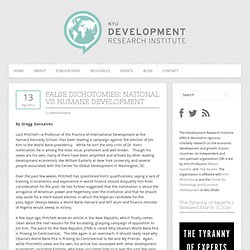
While he isn’t the only critic of Dr. Kim’s nomination, he is among the most vocal, prominent and well known. Though his views are his own, many of them have been amplified and echoed by other leading development economists like William Easterly at New York University and several people associated with the Center for Global Development in Washington, DC. Over the past few weeks, Pritchett has questioned Kim’s qualifications, saying a lack of training in economics and experience in world finance should disqualify him from consideration for the post. A few days ago, Pritchett wrote an article in the New Republic, which finally comes clean about the real reasons for the escalating, grasping campaign of opposition to Jim Kim.
Why do they have such an inability to see this? Mr. Kim vs. the World Bank. The nomination of Jim Yong Kim by President Barack Obama to be the next President of the World Bank is generating plenty of controversy.
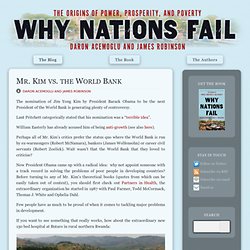
Lant Pritchett categorically stated that his nomination was a “terrible idea”. William Easterly has already accused him of being anti-growth (see also here). Perhaps all of Mr. Jim Yong Kim: My Call for an Open, Inclusive World Bank. PIH co-founder and nominee for World Bank President discusses his vision for the World Bank in an op-ed published by the U.S.
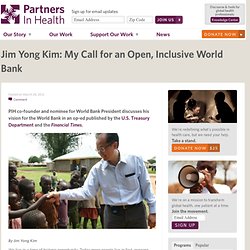
Treasury Department and the Financial Times. By Jim Yong Kim We live in a time of historic opportunity. Today more people live in fast-growing economies than at any time in history, and development can take root anywhere – regardless of whether a country is landlocked, just emerging from conflict or oppression, large or small. If we build on this, we can imagine a world in which billions of people in developing countries enjoy increases in their incomes and living standards. My own life and work have led me to believe that inclusive development – investing in human beings – is an economic and moral imperative.
Every country must follow its own path to growth, but our collective mission must be to ensure that a new generation of low and middle-income countries enjoys sustainable economic growth that generates opportunities for all citizens. Read Dr. Dr. A Better Bank - By Charles Kenny. Barack Obama's administration announced Jim Yong Kim, president of Dartmouth College, as its nominee for the next president of the World Bank on Friday, March 23.
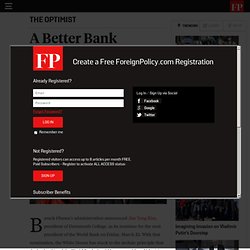
With that nomination, the White House has stuck to the archaic principle that the leadership of the World Bank should be reserved for a U.S. citizen -- Kim was born in South Korea, but he has been in the United States since he was five. On the plus side, however, the White House's selection suggests an interest in moving the World Bank further toward a new operating model, something that is sorely needed in a rapidly changing world. If common sense prevailed, Kim's nomination would be judged equally against the candidate nominated by Nigeria and South Africa -- the corruption-fighting, fuel-subsidy-slashing Nigerian Finance Minister Ngozi Okonjo-Iweala.
Some Not Entirely Typical Remarks by a World Bank President « NYU Development Research Institute. The following quotations are taken from: Jim Yong Kim, Joyce V.
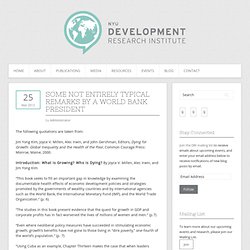
Millen, Alec Irwin, and John Gershman, Editors, Dying for Growth: Global Inequality and the Health of the Poor, Common Courage Press: Monroe, Maine, 2000. Introduction: What is Growing? Who is Dying? By Joyce V. Don't Hire This Man - By Scott Gilmore. "A World Bank for a New World" by Jeffrey D Sachs. Exit from comment view mode.
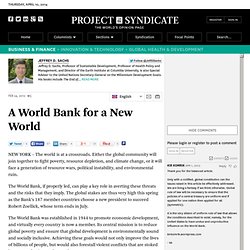
Click to hide this space NEW YORK – The world is at a crossroads. Either the global community will join together to fight poverty, resource depletion, and climate change, or it will face a generation of resource wars, political instability, and environmental ruin. The World Bank, if properly led, can play a key role in averting these threats and the risks that they imply. The global stakes are thus very high this spring as the Bank’s 187 member countries choose a new president to succeed Robert Zoellick, whose term ends in July. The World Bank was established in 1944 to promote economic development, and virtually every country is now a member. American officials have traditionally viewed the World Bank as an extension of United States foreign policy and commercial interests.
How I Would Not Lead the World Bank - By William Easterly. I am gratified by the widespread support that my non-nomination for World Bank president has received.
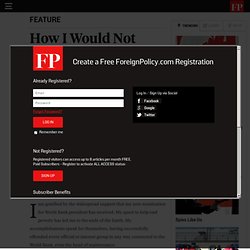
My quest to help end poverty has led me to the ends of the Earth. My accomplishments speak for themselves, having successfully offended every official or interest group in any way connected to the World Bank, even the head of maintenance. I would not lead the World Bank by assembling an expert task force of my fellow social scientists, natural scientists, and random unemployed politicians. I would not ask such a well-qualified expert task force to answer the question "What must we do to end world poverty? " -- especially if we forget to answer the question "Who put us in charge? " Jeffrey Sachs: How I would lead the World Bank as president. I don’t seek the bank presidency because of its financial muscle. The bank’s net disbursements (disbursements minus repayments of funds from the International Bank for Reconstruction and Development as well as the International Development Association) were about $16 billion in fiscal 2011.
That’s a meaningful sum — but global markets easily eclipse the bank as providers of finance. The World Bank is potentially far more decisive than a bank. At its best, the bank serves as a powerhouse of ideas and a meeting ground for key actors who together can solve daunting problems of poverty, hunger, disease and environmental degradation.